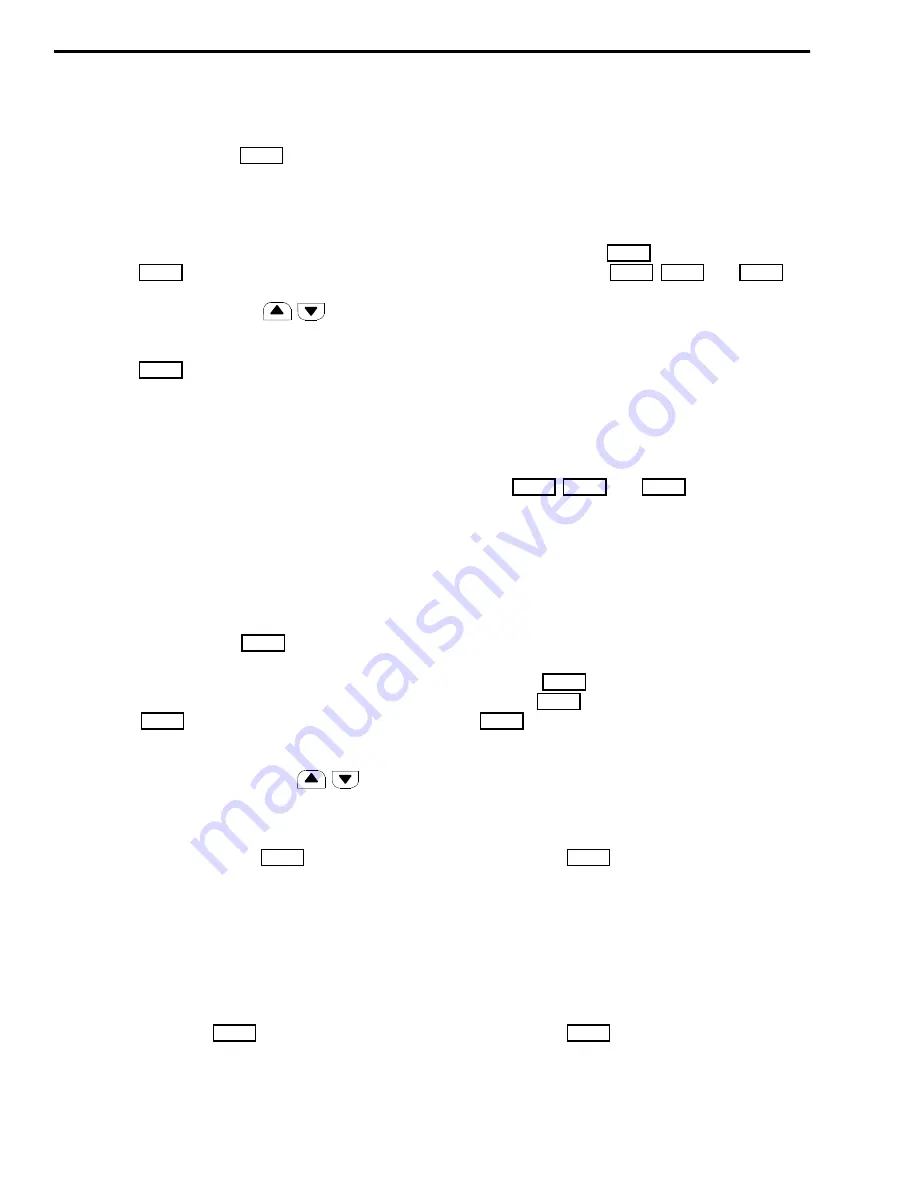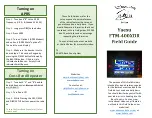
OPERATION
3-6
November 1998
Part No. 001-7600-001
3.5.5 CALL GUARD TONE SELECT
If the transceiver has a
key, the Call
Guard (CTCSS) tone can be selected. This allows calls
to be placed to different mobiles or groups of mobiles
and received on different groups than is normal for the
channel. Proceed as follows:
1. Press the
key and “TON--x” is displayed.
2. Press the channel up/down (
) keys to
select the desired tone (“TON--1” to “TON--9”).
3. Press the
key again to exit this mode. Calls
are then placed on the current channel and other
channels using the new code until it is changed.
4. To reselect the standard Call Guard squelch tone
programmed for the channel, select “TON--M”
using the same procedure.
3.5.6 CHANNEL SELECT
Refer to Section 3.3.5.
3.5.7 DTMF NUMBER SELECT
If the transceiver has a
key, up to seven
preprogrammed telephone numbers can be transmit-
ted. Proceed as follows:
1. Press the
key and the currently selected
number is indicated as “DTMF x”.
2. Press the channel up/down keys (
) to
select a different number.
3. To transmit the selected number on the current
channel, press and hold the
key.
NOTE: The DTMF 6 number is used for emergency
calls and the DTMF 7 number is used for automatic
logging. Therefore, if these features are used, the
number may not be available for regular calls.
3.5.8 EMERGENCY KEY
Press and hold the
key to transmit an
emergency call. To cancel this call before it is trans-
mitted, press and hold this key again. Once emergency
transmission begins, the call cannot be canceled. Pro-
gramming determines the channel on which the call is
transmitted and also if it is transmitted once or repeat-
edly until a control code is received.
3.5.9 LOCK KEY
Press and hold the
key to lock all pro-
grammable keys except
and
.
Either “LK ON” or “LK OF” is displayed to indicate
the current condition. If a locked key is pressed, all
that happens is “LOCK” is displayed.
3.5.10 MONITOR MODE SELECT
Refer to Section 3.4.4.
3.5.11 OUTPUT POWER SELECT
The
and
keys can be used
to temporarily or permanently override the pro-
grammed power output for the channel. The program-
ming of the “RF Power Selection” parameter in Table
4-2 determines operation. Pressing the key once
selects the level on the key and pressing it again
selects the programmed level.
3.5.12 PRIORITY CHANNEL SELECT
Pressing
selects the priority A channel
and pressing
selects the priority B channel.
The
key can also be programmed so that press-
ing and holding the key makes the current channel the
priority A channel. Refer to Section 3.6.3 for more
information.
3.5.13 RECEIVE ATTENUATE
Pressing the
key turns receive signal
attenuation on and off. Either “AT ON” or “AT OF” is
displayed to indicate the current mode. The attenuator
can be turned on if nearby strong RF signals such as
commercial radio stations or pager transmitters are
causing distortion of the receive signal.
3.5.14 SCAN SELECT
Pressing the
key turns the channel scan
feature on and off. Refer to Section 3.6 for more
information.
TONE
TONE
TONE
DTMF
DTMF
DTMF
EMER
LOCK
CALL
MONI
EMER
HIGH
LOW1
LOW2
PRI A
PRI B
PRI A
ATT
SCAN
Summary of Contents for 761X
Page 9: ...GENERAL INFORMATION 1 4 November 1998 Part No 001 7600 001 This page intentionally left blank ...
Page 11: ...GENERAL INFORMATION 1 6 November 1998 Part No 001 7600 001 NOTES ...
Page 43: ...PROGRAMMING 4 18 November 1998 Part No 001 7600 001 This page intentionally left blank ...
Page 87: ...UHF 7640 EXPLODED VIEW 7 22 November 1998 Part No 001 7600 001 FOLDOUT VHF Exploded View ...
Page 90: ...8 3 November 1998 Part No 001 7600 001 VHF 7610 MAIN BOARD BOTTOM VIEW FOLDOUT ...
Page 91: ...8 4 November 1998 Part No 001 7600 001 VHF 7610 MAIN BOARD TOP VIEW ...
Page 94: ...8 7 November 1998 Part No 001 7600 001 UHF 7640 MAIN BOARD BOTTOM VIEW FOLDOUT ...
















































